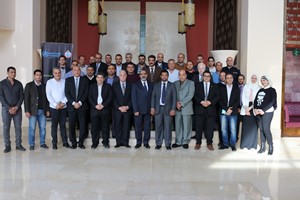 WHO country office in Egypt, in collaboration with the Health Directorate of the Ministry of Health and Population, in South Sinai, has conducted the first emergency response preparedness workshop for all hazards, under the leadership of H.E Dr Ahmed Emad Eldin Rady, Minister of Health and Population, and H.E Mr Khaled Fouda, the governor of South Sinai.
WHO country office in Egypt, in collaboration with the Health Directorate of the Ministry of Health and Population, in South Sinai, has conducted the first emergency response preparedness workshop for all hazards, under the leadership of H.E Dr Ahmed Emad Eldin Rady, Minister of Health and Population, and H.E Mr Khaled Fouda, the governor of South Sinai.
The workshop aimed to demonstrate the health risk profile and build the capacity of health staff on conducting health risk assessment for all hazards within a multisectoral approach by using the WHO strategic tool for assessing risk.
The STAR tool has been prepared to enable countries to conduct an evidence-based assessment of the risks which can be applied in a comparable, reproducible and defensible manner. In addition, use of the STAR tool helped participants to identify priorities for the development of contingency plans and specific responses and to prioritize potential needs for enhancing national capacity in terms of preparedness and response.
For 3 days, 34 representatives of different stakeholders: the Minsitries of Health and Population, Education, Civil Defense, Social Solidarity and Interior Affairs, joined the workshop, and discussed issues of relevance at national and international level, shared best practices and lessons, and observed presentations on all hazards risk assessment and response.
During the workshop, participants used the strategic tool for assessing risk, developed by WHO, as a guideline and to facilitate the capture of data on public health treats and categorized the risk. Also, the workshop included a tabletop exercise, in which participants were led through a fictional scenario developed for the purpose of introducing specific challenges and to highlight gaps in the response to all hazards.
Mr Khaled Fouda, the governor of South Sinai, praised WHO and its efforts on the national level in increasing the response and to prepare for emergencies causing serious public health problems. He emphasised the importance of collaboration between different partners and stakeholders in order to reduce risk and save lives.


